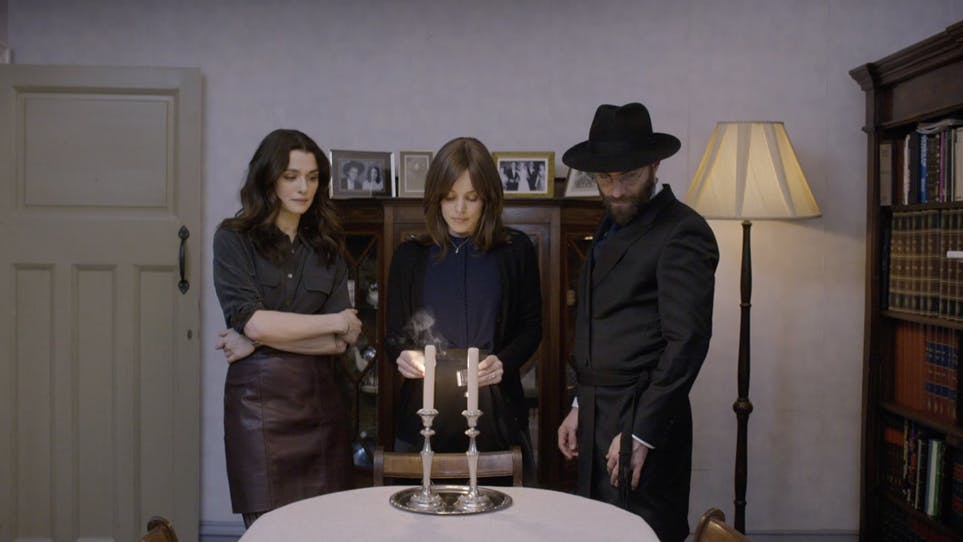
************************This review contains spoilers****************************
“HaShem gave us choice, which is both a privilege and a burden.”
Disobedience follows the story of New York photographer Ronit Krushka (Rachel Weisz) who has returned to the conservative Jewish community in which she was raised following the death of her father and the community’s Rav, Rav Krushka (Anton Lesser). As Ronit prepares to bury her father and come to terms with the dissolution of their relationship after her choice to leave the community, old feelings and issues resurface as she reconnects with her now married best friends, Dovid and Esti Kuperman (Alessandro Nivola and Rachel McAdams). The resulting fallout challenges expectations regarding religion and identity.
The overarching theme presented in Disobedience is how fraught and fragile self-identity can be when one is caught in the midst of cultural norms and expectations. In the film, we’re confronted with the story of a closeted lesbian woman who, despite devoting herself to the conservative teachings of the Jewish faith and completely immersing herself into the life of an obedient, straight wife and mother, cannot completely quell who she is inside and refrain from acting on her innermost desires. The issue of finding the strength to be who we are in the face of a society that prioritizes conformity, particularly for something as morally combustible as sexual preference, is an evergreen topic of discussion and something that everyone can relate to. The film does well with conveying the turmoil that Esti is going through in having to decide between being true to herself while remaining in the only culture and community that she’s ever known.
The film’s title “disobedience” has a sort of double meaning within the film, which is displayed through the experience of the character Esti. As the story unfolds, the life that Esti has chosen for herself results in disobedience in two different forms; that is Esti’s disobedience to the faith, shown through her pursuit and re-connection with Ronit, and the disobedience that Esti has shown to herself and her natural desires and inclinations by pretending to be something she isn’t and choosing to remain in her conservative Jewish community. And while the obstacles faced by Esti due to the stigma placed upon homosexuality was at the forefront in this film, I was also moved to consider the effects that this had on those around her as well. Dovid built an entire life with his marriage to Esti being a big part of it. His standing as a religious leader in their community in part depended on the stability of his home life. Despite the fact that she cared for him deeply, Esti could never be fully invested in him their lives because it went against who she was at her core. Her lack of investment and ultimate decision to leave, devastated Dovid both personally and professionally. In that sense, he too became a victim of the lack of open-mindedness that kept Esti imprisoned all of those years.
This conundrum then led me to consider selfishness for a moment and how under certain circumstances, it can be both a necessity and something to be avoided. For Esti, she needed to exhibit some selfishness in order to free herself from the confines of her culture’s rigidity and erasure of her identity as a homosexual woman. Despite her love for Dovid, her happiness and fulfillment as a person required her to disregard the fallout for him in order to finally find her true self. On the other side of the coin, Dovid had to set his own needs and desires aside in order to give Esti her freedom. To allow his wife to divorce him and go her own way, he would be ending the life he had been working toward building as both a religious leader and a husband. But in order to end the pain and confusion for his lifelong friend and wife, Dovid has to sacrifice himself to save her.
Disobedience is a well acted and executed story about the societal pressures placed upon those who are different and what happens when they’re both forced to conceal those differences and eventually must face a decision on how to live their lives in the face of who they truly are. Despite how well done the film is, I couldn’t shake the feeling that I have seen this topic covered before in much more compelling and interesting ways. Hollywood still has progress to make in bringing LGBTQIA stories to the screen, but this particular kind of story has been done numerous times in the past two years alone, making it hard for Disobedience to really stand out or bring something new to the forefront. Weisz, McAdams, and Nivola are all skilled actors whose performances ensure that the movie is far from a bore or waste of time, but if you’re looking for a take on the issue of closeted people forced to confront both themselves and the societies that forced them into concealment that offers something different than what we saw in 2016 from The Handmaiden or Moonlight or even earlier this year from Becks, Disobedience does not offer it. Despite this, the movie is still a worthy watch.
Image: Bleeker Street

